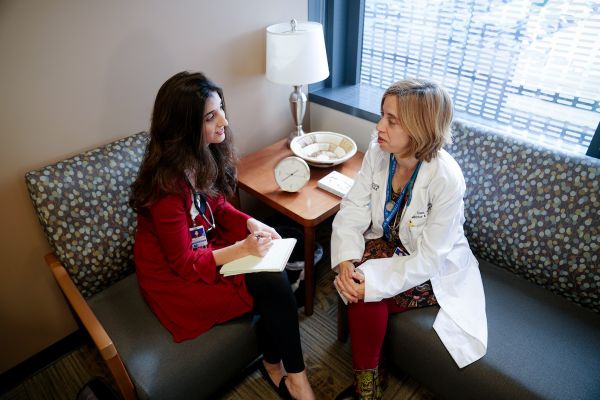“The overall enjoyment of life.” This is how the National Cancer Institute defines quality of life. But when you are a cancer patient and you are in pain, afraid, worried about your family and finances, or unable to do the things that make you happy, can you really enjoy life?
You can, but you may need some extra help, advises Amy Case, MD, FAAHPM, Chair of Roswell Park’s Supportive and Palliative Care program.
Cancer affects quality of life in many ways. Physical symptoms such as pain, nausea, constipation and shortness of breath, plus emotional distress, including depression, anxiety and fear are real and significant challenges to feeling content and joyful. The COVID-19 pandemic is compounding these challenges. Feelings of fear and anxiety are increasing, and physical distancing and other restrictions can mean a patient has completely lost their support system. Seeking supportive and palliative care now is especially important.
“Supportive and palliative care improves quality of life by addressing these symptoms,” says Dr. Case. “We can help patients who are facing pain, nausea, poor sleep, anxiety related to cancer and its treatment, feeling overwhelmed or who don’t have the support they need to get through their treatment.”
Never miss another Cancer Talk blog!
Sign up to receive our monthly Cancer Talk e-newsletter.
Sign up!Palliative care is often confused with hospice care or end of life care. “To palliate means to ‘feel better,’” explains Dr. Case. “Palliative care is provided at any stage of a serious illness, while hospice care refers to the intense palliative care provided at end of life, when curative treatments have ceased.”
“Palliative care can make you feel better whether you are just beginning your cancer journey or are a survivor or anywhere in between,” Dr. Case adds. “Research shows that patients who take advantage of supportive and palliative care tend to live longer, have better pain control, and feel happier and less anxious. It’s better for patients to receive supportive and palliative care earlier in their illness rather than later, so they can receive the maximum benefit from our services.”
What to Expect from Supportive and Palliative Care
This type of care is a medical subspecialty, and Roswell Park’s team includes several physicians, nurse practitioners, social workers, and mental and spiritual health professionals — all with advanced training in palliative care.
“The first thing we do is to get to know you as a person,” says Dr. Case. “What makes you happy? What is making you unhappy? Can you do the things you want to do? From there, we work with you to provide support and direct you to appropriate services and resources.” These may include:
- Pain management
- Emotional support such as personal or family counseling to combat depression, anxiety, distress and conflict resolution.
- Spiritual and pastoral care
- Healthcare planning to help you and your family develop a plan that focuses on your needs and goals, including financial concerns and long term outlook.
The services we offer improve quality of life, improve patient and caregiver satisfaction and are evidence based. I know with certainty that our palliative services have helped many cancer patients and their families feel better and enjoy life more during a very trying time.Amy Case, MD, Chair of Roswell Park’s Supportive and Palliative Care Program
What Unique Programs Does Roswell Park Offer?
Roswell Park’s Supportive and Palliative Care team uses several different approaches to develop the best plan for each patient. These may include:
- Medical marijuana certifications and other medical interventions to address cancer pain, nausea and poor appetite.
- Cranial electrotherapy stimulation, a drug-free option that uses a small TENS-like unit to stimulate neurons in the brain to increase serotonin levels. This therapy, used to treat anxiety, depression and insomnia, has no lasting side effects, no risk of addiction, and no danger of interaction with medication.
- Integrative care, such as acupuncture, massage therapy, meditation, biofeedback, touch therapy, relaxation training and physical therapy.
- Opioid monitoring and pain specialists on-site who are approved to use the pain drug buprenorphine to help blunt opioid cravings in those at risk for substance use disorder.
- Ketamine, an intravenous anti-depressant that is now available in a newly-approved intra-nasal form. Several studies provide evidence of ketamine’s ability to produce rapid and robust antidepressant effects in patients with mood and anxiety disorders that were previously resistant to treatment. The intra-nasal form is believed to have fewer side effects than traditional IV form.
- A spiritual and pastoral care team of more than 65 trained clergy and volunteers to help with crises and questions of faith and healing, with respect to your individual spiritual beliefs.
- Emotional support programs such as Life Recorded give families the opportunity to bring loved ones together to ask meaningful questions and share memories and life experiences.
- Child life specialists help children and families understand and cope with the unique social, emotional and developmental needs of children in stressful situations.
How Can I Get Help?
Your Roswell Park doctors and nurses are trained to recognize people who may need additional support and may refer you to the program. If you are struggling to cope with your cancer and its treatment, talk to your Roswell Park physician about a consultation with the Supportive and Palliative Care team. Or, call 1-800-ROSWELL to request an appointment.




